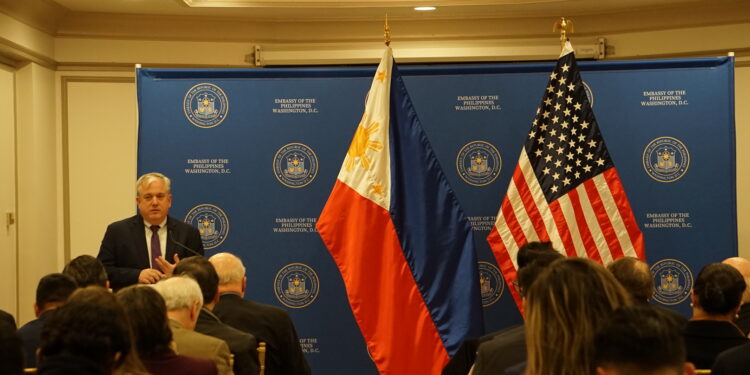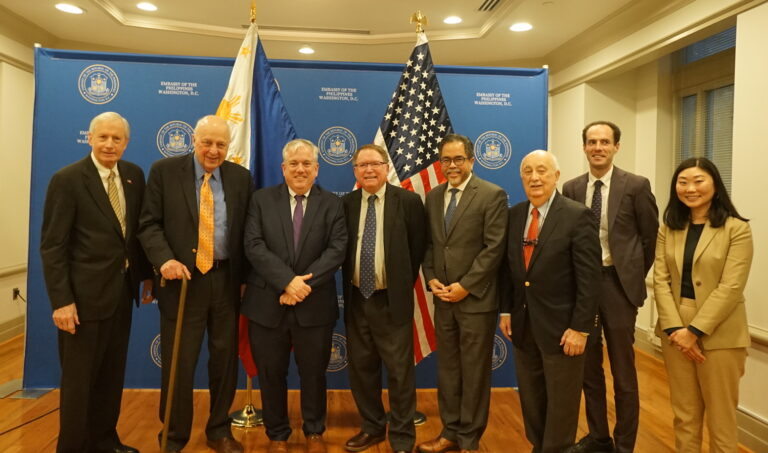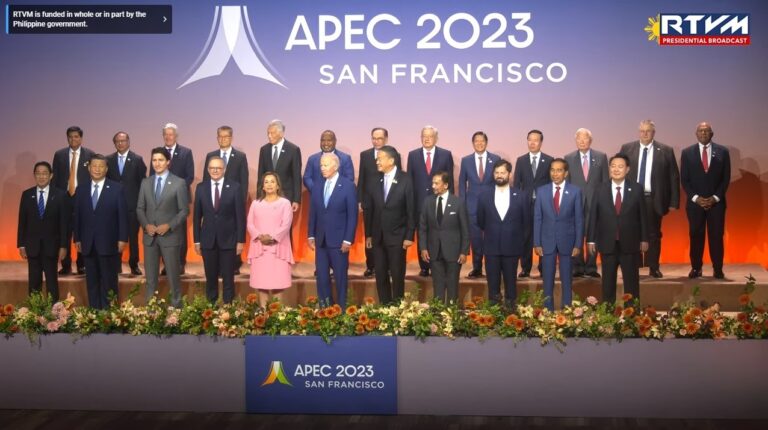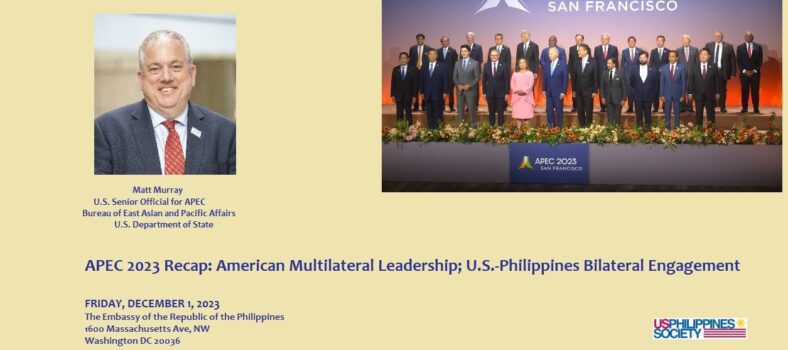APEC 2023: U.S. Leadership Highlights Commitment in Asia Pacific and Enhanced U.S.-PH Engagement

At a December 1 APEC 2023 Recap program, U.S. Senior Official for APEC Matthew Murray provided insights into the Biden administration’s priorities as APEC 2023 host, U.S. engagement with member economies, particularly U.S.-Philippines cooperation on important APEC issues including inclusivity, sustainability, and prosperity. Amb Murray also discussed outcomes culminating in a consensus document, the Golden Gate Declaration, following the leaders’ summit held on November 16-17 in San Francisco, California. State Department Senior Philippine Desk Officer Daniel Rakove discussed two important agreements between the U.S. and Philippine government signed on the APEC sidelines.
The Biden administration welcomed the opportunity to host and lead in advancing economic multilateralism within APEC, representing 21 economies, home of 3 billion people – nearly 40 percent of the world’s population – and almost half of global trade and more than 60 percent of the world’s GDP. Along with the Indo-Pacific Economic Framework for Prosperity, hosting APEC 2023 was a major economic component in the current administration’s overall Indo-Pacific strategy. Citing the first APEC Leaders’ Summit convened by President Bill Clinton in 1993 and attended by the late Philippine President Fidel Ramos, Amb Murray pointed out the U.S. long standing and enduring commitment to the region over 30 years.
In the process of laying out the APEC agenda across diverse economies, Amb Murray was encouraged by substantive participation of key partners like the Philippines. During his July 2023 visit to attend the APEC Business Advisory Council Meeting (ABAC) III in Cebu, Philippines, Amb Murray noted how committed President Marcos Jr was on advancing important issues like the food security agenda, climate change, need for progress in digital economy, and harnessing the untapped potential of small and medium scale enterprises, an initiative advanced by the Philippines in its 2015 APEC hosting, and adopted by APEC. These issues were a major focus at the ministerial level meetings in Seattle this year.
Amb Murray quoted remarks by President Marcos Jr, at the November 15 APEC CEO Summit:
“As member economies of APEC, we are accountable to our people and future generations to deliver sustained growth and prosperity, and while signs point to darker clouds, this opportunity to collaborate once more is light in the economic horizon in our efforts to pre-empt a prolonged downturn and its very negative consequences. My biggest lesson learned from the COVID-19 pandemic is that it disproportionately affected our already disadvantaged, marginalized, and underrepresented sectors.”
Amb Murray also noted the main points in the President’s remarks: economic inclusion; the importance of partnership between governments and stakeholders, and broadening and deepening commitments; sustainability, but also warning that the race to sustainability should not come with the risk of escalating protectionism; and, that the biggest challenge is to increase the level of ambition and enlarge the scope of cooperation among members.
Amb Murray enumerated multiple ministerial outcomes throughout the year that were elevated to the Leaders’ Summit and adopted in the “Golden Gate Declaration.” These included the San Francisco principles on integrating inclusivity and sustainability, trade investment policy, and just energy transition principles that have been agreed to by energy ministers. There were principles on achieving food security for sustainable agri-food systems. There were agreements on a new Disaster Risk Reduction framework and action plan, and “Digital Pacific” economy objectives.
Multiple major initiatives were launched including the inaugural Sustainable Future Forum, where government officials and private sectors commit to address environmental challenges through climate mitigation, adaptation and resilience; inclusive trade and investment; and promoting conservation. In addition, an overall multi stakeholder forum where private sector, civil society, indigenous groups and others convene at the World Affairs Council, along with various stakeholder engagements with micro and small, medium-sized enterprises at the CEO Summit with large and medium corporations. Lastly. the U.S. advanced the APEC Coastal Resilience Framework to help coastal communities build their adaptive capacities to “bounce back” after adverse climate events.
Senior Philippine Desk Officer Dan Rakove discussed conclusion of negotiations between the U.S. and the Philippines on civil nuclear cooperation or the “123 agreement” enabling continued collaboration on nuclear safety as energy demand in the Philippines increases exponentially. Second, a U.S.-Philippines semiconductor supply chain partnership was formed funded by the International Technology Security and Innovation (ITSI) Fund created under the CHIPS Act of 2022, with a goal to create a more resilient, secure, and sustainable global semiconductor value chain. Rakove described an initial phase that will involve a comprehensive assessment of the existing semiconductor workforce and infrastructure noting that private sector including American semiconductor companies have invested hundreds of millions of dollars in the Philippines.
Charge d’Affaires Jaime Ramon T. Ascalon, Jr. discussed the Philippine government’s roadmap, “AmBisyon 2040” (Philippine Aspiration 2040) whereby by 2040, Filipinos should enjoy a strongly rooted, secure and comfortable life, reiterated in President Marcos Jr’s speeches at APEC.
Philippine Embassy Economic Affairs Officer Dominic Imperial, who attended the APEC 2023, related the enthusiasm during meetings and how the Philippines looks forward to working with U.S. counterparts in implementation of agreements signed in San Francisco.
Ambassador Murray fielded questions from the audience representing the US government, the private sector, members of the US-Philippines Society, policy institutes and non-profit organizations. He acknowledged the role of Ambassador Thomas Hubbard and US-Philippines Society members who took part in the 1993 U.S. initiative convening the inaugural leaders group to build a new economic foundation for the Asia-Pacific and thus, a legacy to elevate the APEC ministerial meeting mechanism to the Leaders’ level. APEC remains relevant as an important incubator of ideas and policies with forward-looking solutions to global issues including climate sustainability, potential shocks on food systems and adaptability through collaborative efforts. The U.S. sought opportunities to fulfill bilateral objectives while also fulfilling APEC objectives with broad inter-agency participation involving 14 U.S. government agencies including USAID, Trade Development Agency, the Department of Agriculture, and more.
In closing remarks, Ambassador John F. Maisto observed the level of commitment to the year-long process and the appropriate attention to interconnected economic issues by the U.S. and the Philippines senior representatives. He reiterated the importance of an effective and modern diplomacy that entails a fusion of multilateral collaboration and bilateral cooperation clustered around geographical regions. He thanked Amb Matt Murray for his leadership and successful U.S. hosting of APEC 2023, and commended the Philippine Embassy DCM Ascalon and Consul Imperial for co-sponsoring together with the US-Philippines Society the highly informative APEC 2023 Recap program held at the Romulo Hall, Philippine Embassy Washington DC.

Photo above: l-r: Moderator Executive Director Hank Hendrickson, USPH Society Co-Chair Amb John D. Negroponte, Ambassador Matthew Murray, Ambassador Thomas Hubbard, DCM Jaime Ascalon, USPH Society President Amb John F. Maisto, State Department PH Desk Officers Daniel Rakove and Esther Joe. Philippine Embassy Washington DC, December 1, 2023
|
|


